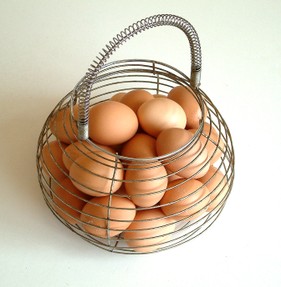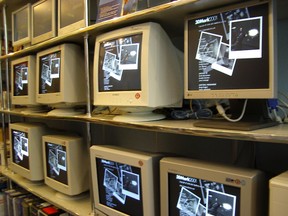Is content writing online still a viable way to make some extra income - or even your entire income? There have been lots of changes in the content writing field in the past year or two, as many of the old platforms have faced challenges staying afloat, suffered "Google slaps" in ranking, or simply been unable to keep up with current technology and consumer demands. Things that worked well a few years ago sometimes no longer do, and if you're just starting out you might be wondering if it's even worthwhile giving it a try.

10 Tips for Beginning Content Writers
by sockii
Are you just getting started in content writing online? Wondering whether it's still worth it? Check out my tips and thoughts for beginners here.
Image above courtesy caprisco at morguefile.com.
My Experience With Content Writing
How I got started, where I am now
I started writing for content sites online approximately five years ago, in early 2010. I started writing on a whim, as I had been running websites and actually writing online for wikis and certain "fan sites" for years. So, I figured, why not try to make some money doing something I already enjoyed?
I began with what was one of the more popular platforms at the time: Associated Content, which then became the Yahoo! Contributors Network. From there I expanded to other sites including Demand Studios, Squidoo, then later Zujava, HubPages, Bubblews and now here at Wizzley. At the same time I also worked on monetizing own personal sites and blogs where appropriate.
With time and patience, I managed to turn content writing into both a satisfying hobby and a means of generating a modest amount of additional income for my household. I'm not earning enough to live off of content writing full-time (nor is that necessarily my goal), but in the past I was certainly earning enough to pay several significant major bills every month - and to generate some additional money around the holidays, when it especially comes in handy!
2014 was admittedly a very rough year, where several platforms I wrote for either went under (Y!CN, Squidoo selling out to HubPages) or faced challenges in earnings potential (Zujava losing its Amazon affiliate account, near absentee management of the site). As such it was the first year where I saw a downturn in my earnings after several years of steady increases:
Year
Y!CN
Squidoo
Demand
Zujava
Bubblews
Other*
Total
2010
382
0
0
0
0
0
382
2011
499
171
525
0
0
0
1195
2012
106
2930
0
0
0
0
3036
2013
274
2830
0
52
524
153
3833
2014
259
1524
0
75
203
224
2286
2015
0.0
0.0
0.0
?.?
?.?
?.?
?
* The "Other" category includes earnings from Amazon Associates, HubPages, and other sites/affiliate programs, some of which prefer you not to disclose specific earning amounts.
It's going to be an interesting challenge in 2015 to try to "pick up the slack" and get my earnings back on a positive trend, hopefully with writing on a few new platforms and continuing to see positive progress on my personal sites, which I feel is definitely an important aspect of any successful content writing portfolio.
But more on that later! Let me get started on my 10 Tips for Beginners without further delay. These are some of the things I wish I'd known when I'd first gotten started, some links and resources I've found useful, as well as some personal thoughts that reflect my experiences and personal point-of-view. I do like to go against the grain sometimes, but at the same time I believe you can't set out to purposefully break the rules until you know what they are and why they're there in the first place. So this is my path and my recommendations. I'll also try to keep this updated with my progress and personal goals for the year ahead.
Tip #1: Have patience.
Content writing is not a way to get rich quick.
 Being successful as an online content writer generally takes a fair amount of time and patience - just look at my earnings chart above! It takes a while to learn the ins and outs of creating pages for different sites, to their guidelines and requirements; time to promote your new content and get it into search engine results and build good backlinks; time to learn what makes for successful content and what doesn't.
Being successful as an online content writer generally takes a fair amount of time and patience - just look at my earnings chart above! It takes a while to learn the ins and outs of creating pages for different sites, to their guidelines and requirements; time to promote your new content and get it into search engine results and build good backlinks; time to learn what makes for successful content and what doesn't.
Your early payouts from various sites and programs may be extremely small (just a few dollars, or pennies even) and most sites/affiliate programs don't payout at all until you reach a certain threshold of earnings, anywhere from $5 to $100. Remember, too, that often earnings are delayed - you may have to wait 2 to 3 months for earnings to be available to your account, so don't count on seeing that "Christmas sales" money until February or March of the following year.
What all of this means is that if you are looking at content writing because you need extra cash - and need it right now - than this is probably not the right type of work you should be considering. (You might do better looking at a site like elance where people are looking for freelance writers for specific, immediate jobs.) And if you see someone promising that they can teach you how to be making hundreds if not thousands of dollars writing online immediately, if you just take their course or buy their e-book, be cautious. That person may be promoting questionable techniques or engaging in promotional techniques that violate the terms of service of a content site.
Image above courtesy Melodi2 at morguefile.com.
Tip #2: Consider your goals.
Are you looking to content writing for fun, for profit, or for a little of both?
 What is your ultimate goal in writing content for websites? Are you just doing this for fun in your spare time, encouraged by the idea you might earn a few dollars along the way? Or are you looking to turn this into a part-time or even full-time job, and if so what are your financial needs?
What is your ultimate goal in writing content for websites? Are you just doing this for fun in your spare time, encouraged by the idea you might earn a few dollars along the way? Or are you looking to turn this into a part-time or even full-time job, and if so what are your financial needs?
These are the things you need to consider in how you look to approach your writing, as well as your discipline in devoting time to it. If it's just going to be a hobby, then go for it and have fun. Learn the basic rules and guidelines and then write about what you want, when you have the time for it - and just don't let it interfere with your regular work and family time.
If you plan on doing content writing as serious source of income, however, you need to be more serious about it as well. Spend the time learning about effective keywords, SEO, promotion and how to market both yourself and the products you may want to sell. Invest in the things you may need in order to do your work properly, be it a better camera for taking your own photographs for articles, or books on grammar and how to improve your writing skills.
Set short term and long term goals for yourself: how much money do you want to be making in six months time? In a year's time? How much do you need to be making in order to pay your bills and expenses? If content writing is to be your job, then you must treat it as such in order to reach the levels of success you are aiming for.
Image above courtesy wax115 at morguefile.com.
Tip #3: Don't put all of your eggs in one basket.
Put time into developing content on several different platforms.
 So you've started writing here on Wizzley, for instance, and you love creating content for this site. Great! But have you explored the other content sites out there to see how they compare, such as Goody Guides, Whyrll, or Spacial Anomaly? (All three, by the way, started by writers with long time experience on sites such as Squidoo, Wizzley and elsewhere.)
So you've started writing here on Wizzley, for instance, and you love creating content for this site. Great! But have you explored the other content sites out there to see how they compare, such as Goody Guides, Whyrll, or Spacial Anomaly? (All three, by the way, started by writers with long time experience on sites such as Squidoo, Wizzley and elsewhere.)
Do you have your own blog - or several of them - that you are attempting to monetize?
Creating content across different platforms will give you the chance to see where your best source or sources of income may lie. If you like writing specifically about current events and hot topics, a site like Persona Paper might work best for you because you can get published fast, and earn based on the hits you get quickly on your topic. However, if you prefer writing on more evergreen or specialized items, or want to promote affiliate sales, you'd likely do better elsewhere.
Another important reason to invest time into different platforms is that content sites can change their rules, guidelines and requirements at the drop of the hat - especially in response to how Google ranks and views their site overall. A content site could unexpectedly go under completely with only a few month's warning, if that. A site that is generating hundreds of dollars in income for you one month might suddenly introduce changes the next month that cuts your income in half - or worse! I've had it happen to me several times in the past and had to scramble to make up the lost revenue on another platform...if possible. If you have content on several sites going, however, the loss of one site as a source of income isn't likely to hit you as hard. You'll also be better situated to shift gears and focus if need be.
Image courtesy anon at morguefile.com.
Tip #4: Don't spread yourself too thin.
Try out different content sites and platforms, but not too many all at once.
 Despite the advice above, don't dabble in too many different platforms and content sites willy-nilly and expect to see good results. There is a definite synergy that develops once you have a minimum amount of content on a single site, have learned what works there and what doesn't, and can interlink your content to develop a strong "niche". In my experience you need to create at least 20-30 articles/leaves/lenses/hubs/etc on a site before you start to see any small results, or even begin to get a sense of what type of content will perform best for you on that site. And it's when you hit 50 and then 100 items of content on a site that revenue begins to really start to build.
Despite the advice above, don't dabble in too many different platforms and content sites willy-nilly and expect to see good results. There is a definite synergy that develops once you have a minimum amount of content on a single site, have learned what works there and what doesn't, and can interlink your content to develop a strong "niche". In my experience you need to create at least 20-30 articles/leaves/lenses/hubs/etc on a site before you start to see any small results, or even begin to get a sense of what type of content will perform best for you on that site. And it's when you hit 50 and then 100 items of content on a site that revenue begins to really start to build.
Working on too many different content sites at once can also be confusing, if you're constantly having to remember how to format images and text for one site versus another. It can also mean a longer period of time until you start actually receiving payment, depending on the payout minimum threshold for a particular site. So take the time to get comfortably established on one platform first before adding a new one into the mix.
Image courtest wcizmowski at morguefile.com.
Tip #5: Share your passions and knowledge.
Write about what you know and your unique fields of interest and expertise.
 When you create content about something you are personally knowledgeable about, it comes across in the authority of your writer's voice. You are more able to write in your own words and style, versus if you have to do a lot of research and end up having to quote and reference lots of other sources.
When you create content about something you are personally knowledgeable about, it comes across in the authority of your writer's voice. You are more able to write in your own words and style, versus if you have to do a lot of research and end up having to quote and reference lots of other sources.
So what is it you really love, and perhaps know more about than most people? Are you a crafter, a collector or an avid reader? Do you love animals and have a lot of experience with pets - or maybe even raising farm animals? What about your experience as a parent, caregiver, or in your job/career? These are all subjects you can explore and turn into useful - and potentially lucrative - content for the web.
One caveat to this, however, is that you can't always assume there will be enough people interested in your particular odd little hobby or interest to make it a successful niche on a content site. You might have studied and developed a deep fascination for Tuvan throat singing...but are there enough people out there who share your interest? Of course, you never know until you give an article or two a try. I was surprised by how well my classical oil painting tutorials on Squidoo took off and became one of my best performing niches on the site, continually drawing steady traffic and product sales with little maintenance and updating work on my part. In contrast, other niches I've tried to develop, such as on some of my favorite bands and artists, are fun for me to write but don't tend to perform nearly as well.
Image courtesy JoeysPhotos at morguefile.com.
Tip #6: Find a surprisingly successful topic? Run with it!
Build a niche when you find your "sweet spot".
 Sometimes success can really hit on a topic where you didn't expect it, or to an extent that surprises you. When I published my first article analyzing Weight Watchers' PointsPlus program (on Y!CN at the time, now on one of my personal blogs), I expected it to get a fair amount of traffic - but not the thousands of hits it quickly received. I quickly followed it up with one of my first lenses on Squidoo, examining the mathematical problems behind the new Weight Watchers formulas for certain individuals. This lens quickly became a steady "Tier 1" performer and stayed constant as such for several years.
Sometimes success can really hit on a topic where you didn't expect it, or to an extent that surprises you. When I published my first article analyzing Weight Watchers' PointsPlus program (on Y!CN at the time, now on one of my personal blogs), I expected it to get a fair amount of traffic - but not the thousands of hits it quickly received. I quickly followed it up with one of my first lenses on Squidoo, examining the mathematical problems behind the new Weight Watchers formulas for certain individuals. This lens quickly became a steady "Tier 1" performer and stayed constant as such for several years.
I didn't set out to write extensively on this topic (weight loss, after all, can be a dodgy subject online because of so many scams, fad diets and questionable supplements) but given the surprise success, I continued to build upon it with a new lens every year on the subject, and linking articles/blog posts elsewhere. Likewise, whenever else I have ended up with a "surprise hit" of an article or Squidoo lens, I worked to build up a niche or collection of content around that first successful article instead of just relying on that one initial piece to remain successful on its own for any length of time.
Image courtesy danielito at morguefile.com.
 | NICHE HACKS: The Ultimate Guide to Finding A Profitable Niche Everything you need to know on how to find profitable markets and I created this for YOU.The Step by Step Guide on Out How To Find A Profitable Niche MarketDo you have a dream o... Only $3.99 |
 | Finding Your Niche For Nonfiction Authors: A Step-By-Step Guide To Spreading Your Message to the ... What is one of the biggest mistakes authors make? Not developing a niche audience before writing and promoting their book. Most authors write their book for “everyone” without r... Only $3.99 |
Tip #7: Submit your work for critique - and develop a thick skin.
It can be tough to hear criticism, but know that it's given with your best interests in mind.
 Just about every content platform has a forum or board dedicated to peer review and critique of each other's work. It can be intimidating to submit your articles/wizzles/hubs/etc for others to pick apart and criticize, but doing so can be a tremendous learning experience. Remember that these people are offering you advice based on their own hard-earned knowledge, successes and failures, and with your benefit in mind - and the benefit of a site as a whole in order to improve the overall quality of work that is there.
Just about every content platform has a forum or board dedicated to peer review and critique of each other's work. It can be intimidating to submit your articles/wizzles/hubs/etc for others to pick apart and criticize, but doing so can be a tremendous learning experience. Remember that these people are offering you advice based on their own hard-earned knowledge, successes and failures, and with your benefit in mind - and the benefit of a site as a whole in order to improve the overall quality of work that is there.
Don't get defensive about the critique you receive. It might be hard to hear your work isn't as perfect or wonderful as you believe it is, but no one is out to criticize you just to put you down. They might be warning you about issues like image rights, duplicate text, or subject matter which might actually be in violation of a content site's terms of service. They might simply be giving you advice on how better to format your page in order to encourage sales, SEO, click-outs and other factors that will improve your performance.
So before jumping in angrily to tell someone how wrong they are in their criticism of your work, take a deep breath, a step away from the computer, and give yourself time to digest the information. Look at your work again with fresh eyes and then see if you agree or disagree with that critique. Be courteous and thank those who put their time into looking at your work, especially if you want to receive more feedback and critique from them in the future.
Image courtesy xandert at morguefile.com.
Tip #8: Invest in a good camera.
Great pictures make for great original content.
 But, wait a minute...you're here to read about writing, not photography, right?
But, wait a minute...you're here to read about writing, not photography, right?
Wrong.
If there's one thing I wish I'd done earlier in my days of content writing, it would be investing in a professional grade camera. A key factor in getting eyes on your content - and keeping it there - is having bright, colorful, captivating and high-quality images on your pages. When I finally invested in an entry-grade DSLR camera, the difference in photo quality was striking when compared to pictures from either my cell phone camera, or even my old Nikon Coolpix. Want proof? Compare the following two pages I created, both very similar in format but one using my old iPhone for photos, the other my DSLR camera:
1. BBQ Hot Dog Casserole - iPhone photos
2. Stuffed Peppers with Eggplant and Roasted Tomatoes - DSLR camera photos
Which page has more colorful, vibrant photos? Which recipe are you more likely to feel compelled to try cooking? Note that both sets of photos were taken in the same exact kitchen, same lighting, etc. Just different cameras.
Taking your own photos - and good quality photos - also helps make your work unique. Yes, morguefile and wikipedia can be handy when you just don't have an image you need (I've used mostly images from morguefile on this article myself!) However, those same images are probably being used by others all around the web, and they may not exactly reflect your content the way your own photographs can.
The photographs you take can also inspire you and give you ideas for new content to write. You just never know when you might come across something interesting, cook up a great new dish for dinner, or visit a unique place. Be ready at any time to capture the moment with your own great photos and you'll soon build up your own reference library of images to use at any time.
Image courtesy GaborfromHungary at morguefile.com.
My camera (at least, the current/upgraded model of it!)
 | Nikon D5100 16.2MP CMOS Digital SLR Camera with 3-Inch Vari-Angle LCD Monitor (Body Only)Nikon / Only $599.0 |
Tip #9: Back. Up. Everything.
Make sure your hard work is protected - and saved for future reference.
 This is something we are probably all guilty of on occasion - or constantly! Are you saving copies of your content on your home computer after you've finished publishing it? How about any photos you used on your page or article?
This is something we are probably all guilty of on occasion - or constantly! Are you saving copies of your content on your home computer after you've finished publishing it? How about any photos you used on your page or article?
Saving backup copies of your hard work is vital for many reasons. Say you go back to edit a Wizzle or other article, and a bug or browser crash loses your previous data (or the text you've just spent an hour typing direct into a module). What if a content site goes down for good, or goes on a content "purge" and suddenly deletes your previously articles? (I had that happen to me with Suite101.) If you didn't save a copy for yourself - even just a complete screencapture - recreating your hard work can be difficult if not downright impossible.
You don't want to lose all of your hard work and effort like that. There are many tools available to help you keep copies of your work on your home computer - and don't forget to back that up as well to an external storage device! I like the simple program Paparazzi! for Mac for taking full-page screencaptures.
Image courtesy Alviman at morguefile.com.
JumpDrives...A lot of storage in a little space.
Tip #10: Take everyone's advice with a grain of salt - including mine.
You know what they say about people and opinions...
No matter what you've read here, in other blogs, in ebooks and on forums, be sure to think critically for yourself and not be afraid to do things differently. Be true to yourself, your voice, and your instincts. Read advice with an open mind, but if someone tells you there's only one way (ie, their way) to be a successful content writer online, don't believe them.
Be original, be creative, be dedicated and be you. That's the most important piece of advice I can offer to anyone.
You might also like
There is a Google alternative? Really?When doing a research, don't rely on Google only. To stand out from the crowd...
How The Shift to Mobile Impacts Online Writers' Bottom LineGoogle's 2012 Q3 earnings dropped because more people are browsing the web on...






 A Potentially Fatal Accident in the Homeon 11/24/2018
A Potentially Fatal Accident in the Homeon 11/24/2018
 Windsurfing Lessons on Montserrat: One of My Funniest—and Fondest—Travel Memorieson 11/20/2018
Windsurfing Lessons on Montserrat: One of My Funniest—and Fondest—Travel Memorieson 11/20/2018
 Christmas Ornaments Celebrating Rome, Italyon 11/12/2018
Christmas Ornaments Celebrating Rome, Italyon 11/12/2018
 Philadelphia-Themed Christmas Ornamentson 11/09/2018
Philadelphia-Themed Christmas Ornamentson 11/09/2018



Comments
Thanks for this article! Highly useful.
It's definitely getting harder and harder these days. For the past year or two it's seemed like every time a site was really starting to take off for me, things backfired and the site went under, lost their affiliate account connections, got google slapped, etc. On top of everything else last year when I was starting to do well with Allposters, they stopped allowing New Jersey affiliates! For a while I almost was ready to give up, but I've been putting more effort into my own websites now where I can have better control over my content - and success/failure rests only on my shoulders, you know? I've been moving some of my pages off Zujava and HubPages over here if they didn't fit my niche sites and to see if they can perform better on Wizzley instead. I like the layout and options here and it seems like a nicer, more stable community.
Thank you for sharing your earnings from other platforms. It's hard to truly diversify. If a platform is dependent upon Google for its traffic, it can get taken out with all of the others. It's certainly not getting any easier to make money online.